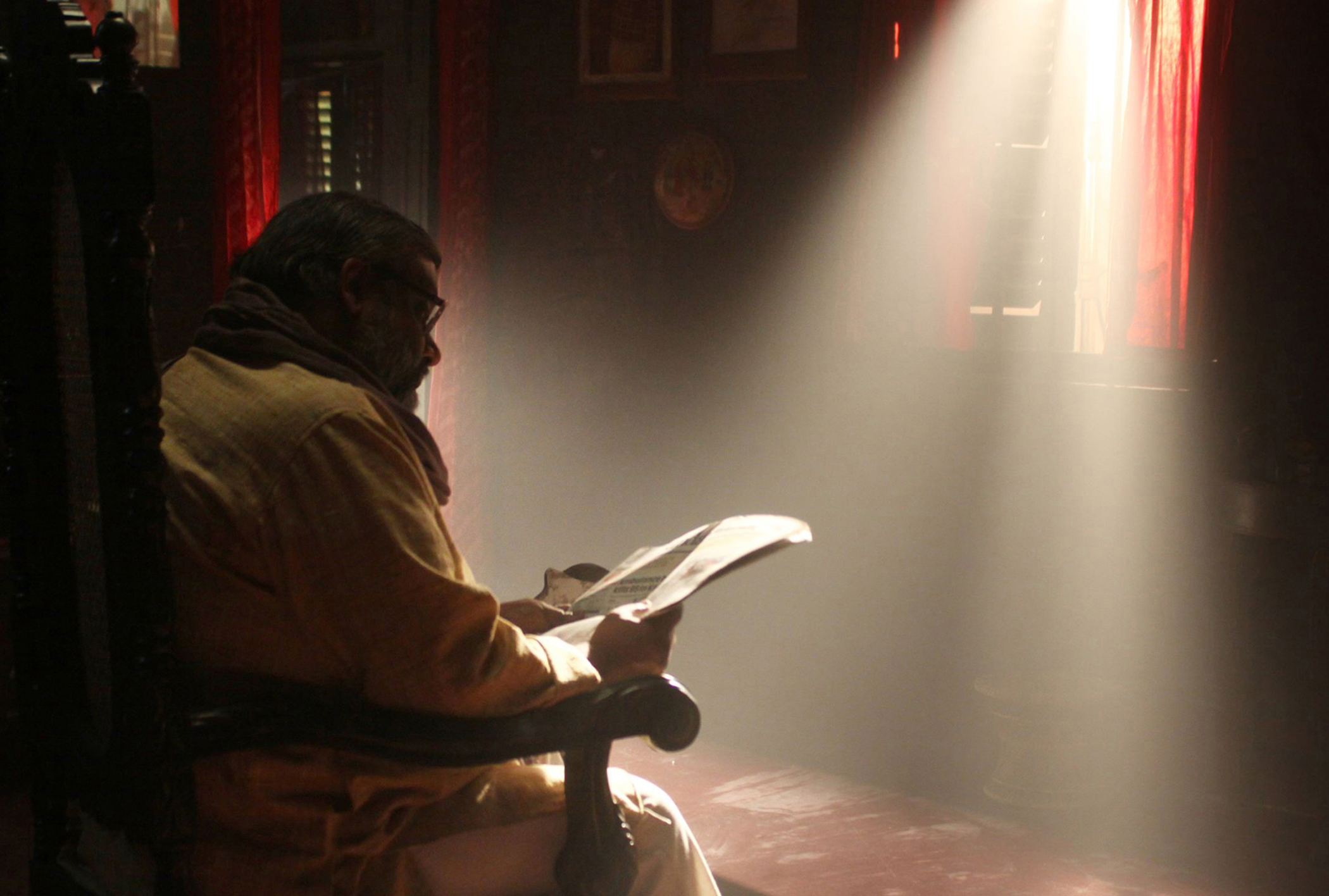Kedara marks a wonderful directorial debut for music director Indraadip Dasgupta, the most grounded and low-profile personality in the entire Bengali film industry today. The word kedara means “armchair” and the film’s protagonist, Narasingh (Kaushik Ganguly), has a strange dream – to own and enjoy a grand armchair. But his lifestyle, his circumstances and his environment are not quite friendly with the idea of a regal-looking armchair. However, dreams are always random and even magical and are not always dependent on the dreamer. Kedara is all about a simple piece of furniture that is the dream of a man who is rubbished by everyone around him as a failure and as unpresentable in mainstream society. That he is a failure and is guilty of being one keeps him stuck in a hole of alienation and loneliness he does not wish to come out of.
Narasingh is a middle-aged, obese, dark, squint-eyed social recluse who lives alone in his ancestral home. He once made a living out of ventriloquism – the throwing of his voice so that it feels as if someone else is speaking in a different voice – across gender, age, education, diction and status. In a stage performance, a ventriloquist usually uses a puppet and “throws” his voice at the puppet to put up a funny “question-and-answer” performance. But as the demand for his kind of art has collapsed, Narsingh uses his special skill to strip himself of his loneliness. He does his own marketing, comes home and cooks his own meal while “conversing” with his dead grandmother and other family members close to him. He lives in a world of his own, often retreating into his boyhood in school. He cherishes memories of his time spent with his son, who no longer lives with him, his wife having left him some years ago.
Narasingh has an annoying neighbor (Rajat Ganguly), who never tires of pointing out that he is a failure who could do nothing except mimicking the voices of other people and the cries of birds and animals. Yet shamelessly, this neighbor does not balk at enjoying a cup of tea made and served by Narasingh. The only person who really likes and respects him is the young Keshto (Rudranil Ghosh) who runs a small business in selling junk and renting out antique goods to film units for a price. Keshto uses Narasingh’s home to stock some of his larger size antiques and one day he brings a regal looking antique armchair for Narasingh for a temporary period. Naarsingh sits on this chair fixed with a small mirror and feels like a king. His life changes as if through the touch of an imaginary magic wand surprising and shocking everyone who treated him with insults and disrespect. But what will happen when Keshto comes to fetch the armchair back?
Kaushik Ganguly is the life and soul of the film. One doubts if the film would have acquired the brilliance it has with a different actor because he makes it convincing not only with his performance and his body language but with his physical appearance also. He actually trained in ventriloquism to make his performance authentic and lives the role of Narasingh. Ganguly fittingly won the Best Actor Award last year at the Kolkata International Film Festival for arguably the finest performance of his career. The other wonderful performance comes from Rudranil Ghosh as Keshto. Rajat Ganguly as the irritating neighbor who gets as good as he has given to Narasingh all these years, is also very good.
Though Dasgupta is a reputed composer, he hands over the charge of the musical score to Arijit Singh. There are no songs in this film where silence dominates, punctuated by sound effects with a touching background score by Singh. The evocative sound design is orchestrated fittingly by Anirban Sengupta, going well with the mood of the film. Cinematographer Subhankar Bhar fills the spaces with greyish blue tints that help in bringing out the gloomy lifestyle of Narasingh while the walls of the outer room are filled with masks of coloured paper, paper mache and other ancient knick-knacks. But the colour palette gradually become brighter reflecting the brightness that has come to Narasingh’s life through the entry of the armchair. One notices lines of lit candles against the window sill and other shelves in the room while Narasingh enjoys the lush luxury of his seemingly royal existence that fills him with a confidence, courage and forthrightness he never imagined he was capable of.
Srijato, who has written the dialogue has added the right bit of punch as and when. The best line in the entire film is when Narasingh tells his neighbor: “Everyone in the world is a failure in some respect or another.” It is a line you take away and keep with you as you walk out of the theatre.
Kedara won a Special Jury Award at the National Awards, 2019.
Bengali, Drama, Color


